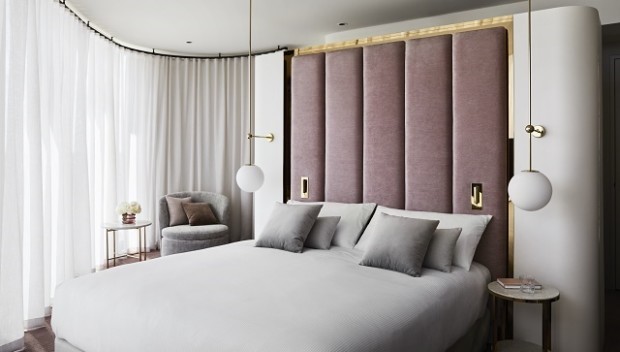The consumer shift into social media documented experiences rather than tangible goods acquisition as an expression of identity has seen a number of luxury brands diversify into travel and leisure services. Most notably, luxury hotels and spas enable a brand to holistically project a lifestyle. Potentially ahead of its time, Palazzo Versace on Australia’s Gold Coast was considered the first “fashion brand hotel” in the world at its opening in 2000. Since then, there has been a plethora of
ra of similar luxury brand hotel offerings, ramping up in the past five or so years.
Sunland Group approached Gianni Versace – who was known for his love of architecture – with the idea of a branded hotel in 1997. At the time, Versace was the only fashion brand with a home collection that could be easily translated into room decor. The resulting Palazzo Versace features Versace furnishings, fittings and a retail store. It more recently added a “Rolls Royce experience” for luxe transport in a Rolls Royce kitted out in Versace signature elements.
The Palazzo also features a private marina at which guests can moor their boat while they dine in one of the hotel’s restaurants. Subsequently, a Palazzo Versace Dubai was opened by Donatella Versace in late 2016. Along with 215 suites and 169 condominiums, it features a Versace Home Collection store, a spa and three outdoor pools, as well as a complimentary shuttle service to the Dubai Mall and Festival City Mall.
Armani at the Burj Khalifa
Dubai is also home to the Armani hotel, located over 10 floors in the famous Burj Khalifa, the world’s tallest tower. With its own entrance, the Armani features custom furnishings and wood panels, a deluxe spa and Armani goods as well as a “personal lifestyle manager” (effectively a butler or concierge) allocated to each guest.
In Paris’s Saint Germain district, the Hotel Le Bellechasse by fashion designer Christian Lacroix features rooms designed around seven different “universes” (Patchwork, Avengers, Saint-Germain, Tuileries, Musketeers, Jeu de Paume and Quai d’Orsay). Smartphones and iPads are made available to guests for their whole stay.
Christian Louboutin, of the famed red-soled shoes, has slated for opening in mid-2020 a yet-to-be-named boutique hotel in Portugal’s Alentejo region, where he has a holiday home. It will feature a restaurant serving organic cuisine from locally sourced products, particularly cheese.
Taking a slightly different tack with an “exotic” rather than urban destination, Round Hill Hotel and Villas by Ralph Lauren is located in Jamaica, a private enclave of luxury villas within a 50-hectare estate.
As befits one of the world’s biggest luxury conglomerates, LVMH – owners of Fendi, Louis Vuitton, Celine and Dior among others – has its manicured fingers in a number of luxury hotel pies. It owns the Cheval Blanc chain of boutique hotel properties, founded in 2006 and currently numbering five but with a sixth opening in Paris in 2021 and a seventh announced for opening in 2022 in London’s upscale Mayfair. It will likely house a Celine store to complement its Louis Vuitton cafe and underground spa. Louis Vuitton and Christian Dior flagship stores are located within walking distance.
The Cheval Blanc brand also operates the jewellery brand Bulgari hotels, with Paris Bulgari due to open in 2020 in the “Triangle d’Or” district which sports a haute couture fashion house on seemingly every corner. The Bulgari hotel in London’s Knightsbridge opened in 2012 and includes personalised fitness coaching workshops, a private in-suite spa, a theatre seating 47 people, a cigar lounge offering tastings, and a ballroom.
In 2019, LVMH acquired the Belmond Hotel Group (formerly Orient Express), giving it an additional portfolio of 46 hotel, rail and river cruise experiences.
Synergy with shopping
Rather than build their own hotels, some brands have collaborated with existing properties to design parts of the experience such as particular rooms or suites, and spas. Examples include Diane Von Furstenberg’s suite and rooms at Claridge’s, London; the Dior Suite at the Regis, New York; Schlosshotel Im Grunewald Suite by Karl Lagerfeld, Berlin; and the Shiseido Spa at the Four Seasons, Cyprus.
Luxury hotel chain Aman is set in 2020 to open its New York location on swanky Fifth Avenue. It follows a raft of luxury hotels operating near retail precincts, particularly in Asia where hotels are directly connected via walkways to upscale malls in Jakarta, Bangkok, Shanghai, Shenzhen, Kuala Lumpur and Taipei. In Australia, Victoria’s Chadstone shopping centre opened the Hotel Chadstone, operated by Accor under its MGallery by Sofitel brand and joining the shopping centre via a walkway. Aside from welcoming guests, it is envisaged the hotel will be used by retailers and brands alike for corporate events and launches.
And then there’s the Mercure hotel currently being built on top of a Bunnings store in Melbourne’s Doncaster. Neither of which screams “luxury” but they do experiment with the limits of the synergy between travel, leisure and retail.
Turning to travel, leisure and hospitality enables companies to not only promote their brands but further diversify their interests in an age where acquisition of “things” appears to be on the decline. It makes one wonder who’s next, as the concept doesn’t have to apply only to luxury, or only to fashion. One could envisage a Levi Strauss ranch or an Etude House hotel and spa – permanent rather than pop-up experiences.
Norrelle has 20 years’ experience in retail, category, channel and customer strategy, planning, research and marketing, working in and with global retailers, manufacturers, research and consulting houses. Contact Norrelle on 0411735190 or email norrellegoldring@hotmail.com

